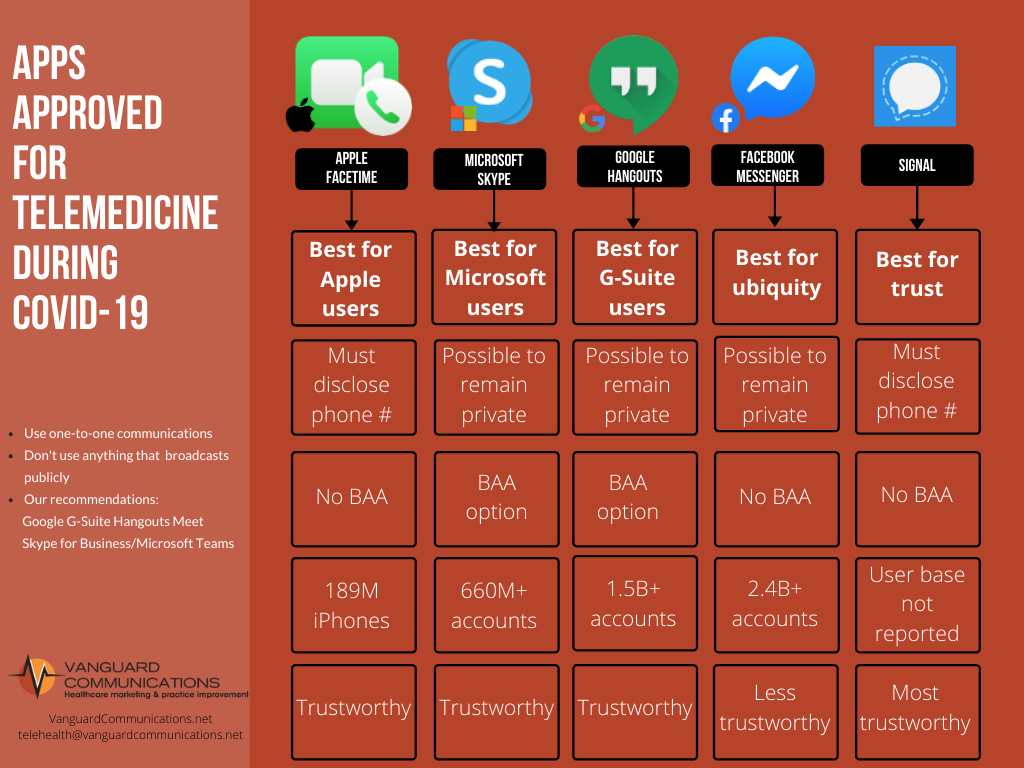With apps for telemedicine, consider fast setup, security, patient preferences, trustworthiness & durability
See our cheat sheet on the best free apps for telemedicine
By Jonathan Stanley, technology director, March 27, 2020
When I hear the terms “telehealth” and “telemedicine,” I think of some complicated or expensive system. But that doesn’t have to be the case during the COVID-19 emergency. The HIPAA waiver enacted on March 15, 2020, allows providers and patients to temporarily use popular video and chat apps for virtual visits. So, what are the best free apps for telemedicine right now?
Restrictions have been lifted for the time being during the Coronavirus pandemic such that any video or chat app is allowable for telemedicine. Apps that can be used temporarily for telehealth include Apple FaceTime, Microsoft Skype, Google Hangouts, Facebook Messenger and Signal, among many more. (See the graphic below.)
Note: The HIPAA waiver does not include public-facing apps, such as Facebook Live, Twitch, TikTok or Slack. Any app that broadcasts to an audience or to the public is not allowable for telehealth services under the waiver.
What are the best free apps for telemedicine that can be set up immediately?
Medical practices are not limited to only one. Every practice is different. Try one, and if a problem arises for your particular system, you can always try another. Or try several simultaneously.
What systems does your practice already have?
Some apps are well integrated into certain systems. If your practice uses Microsoft Office or email, you may want to choose Skype. If you use Google G-Suite, you may opt for Hangouts. Your electronic health records (EHR) system or medical practice management system (PMS) may also have in-built support for certain teleconferencing apps.
Are your providers willing to disclose contact information?
A lot of people like using FaceTime on iPhones. The caveat, of course, is that in order to call someone using FaceTime, each party must know the other’s phone number. Practices may not want to give their patients direct phone access to their providers’ personal iPhones. Skype, Facebook Messenger and Google Hangouts can be set up so that you don’t have to disclose that sort of personal provider information.
What apps do your patients prefer?
FaceTime has more than 1 billion users, so it’s extremely popular and patient friendly. Engagement with FaceTime as well as Hangouts and Signal is also easy and friendly. Ask your patients what apps they prefer. (Some patients may even tell you how they want to communicate.)
Which apps are trustworthy for telehealth services?
I would put Signal at the top of my list for security. While Signal does not offer a BAA (Business Associate Agreement; see explanation below), it is extremely high quality in its security measures. Apple FaceTime and Google Hangouts are trustworthy as well. Remember, even though HIPAA has relaxed some of its security rules, providers should still follow standard of care stipulations, including being reasonable, prudent and safe in delivering care.
Which apps are durable beyond the coronavirus emergency?
To be diligent about the standard of care and HIPAA security rules, look for an app that offers a BAA. This is an agreement between a provider and the vendor that ensures the safeguarding of personal, protected health information (PHI). Microsoft Skype and Google G-Suite Hangouts Meet both offer a BAA and private video chat sessions.
Which one of the best free apps for telemedicine is right for you?
There is no one option that’s going to be a perfect solution. It depends on what EHR and practice management systems you’re using, what email platform is already in place, just how much access you want patients to have to providers, and user-friendliness.
Also consider how much value your practice places on security and trustworthiness – not only for the practice’s people and systems but also for the patients’ phones, computers and personal data.
Here is an apps comparison cheat sheet of temporarily, legally approved apps for telehealth services during the HIPAA waiver time period.
For more information about using chat apps for telehealth services during COVID-19, view our recent webinar featuring a healthcare lawyer, medical doctor and technical guru.
